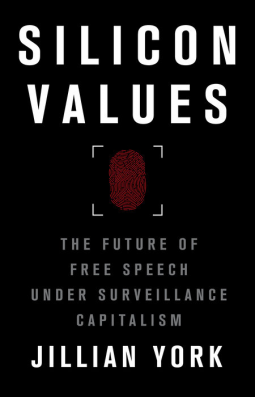
Silicon Values
The Future of Free Speech Under Surveillance Capitalism
by Jillian C. York
This title was previously available on NetGalley and is now archived.
Send NetGalley books directly to your Kindle or Kindle app
1
To read on a Kindle or Kindle app, please add kindle@netgalley.com as an approved email address to receive files in your Amazon account. Click here for step-by-step instructions.
2
Also find your Kindle email address within your Amazon account, and enter it here.
Pub Date Mar 23 2021 | Archive Date Mar 23 2021
Verso Books (US) | Verso
Talking about this book? Use #SiliconValues #NetGalley. More hashtag tips!
Description
Who decides what is permissible on the internet: Politicians? Mark Zuckerberg? Users? Who determines when political debate becomes hate speech? How does this impact our identity or our ability to create communities and to protest? Silicon Values reports on the war for digital rights and how major corporations—Facebook, Twitter, Google and Tiktok—threaten democracy as they harvest our personal data in the pursuit of profit.
Available Editions
| EDITION | Other Format |
| ISBN | 9781788738804 |
| PRICE | $26.95 (USD) |
| PAGES | 288 |
Featured Reviews
Following closely in the footsteps of Rebecca Mackinnon and Shoshana Zuboff, Jillian York in her interesting, upcoming and provocative work, “Silicon Values”, distills the various anomalies involved in “content moderation” that is practiced (or abdicated) by the giants of technology such as Google, Facebook, YouTube and Twitter. Ms. York brings to bear her formidable experience with and exposure to content moderation and platform intricacies in alluding to various hits and misses that both distinguish and tarnish Big Tech. A writing style that is bereft of pretentiousness and hesitancy makes Silicon Values a riveting read.
Ms. York bemoans the fact that the most aspired for and valued attribute, in the form of freedom of speech is controlled and curbed by a handful of gargantuan personalities striding the very pinnacle of Big Tech and whose actions are influenced by and beholden to powerful political connections, financial prospects and influential lobbying. Tweets and posts of influential and award winning activists such as Wael Abbas, that not just expose, but also educate the people about police brutality and other abuses in Egypt, are thus take down by the social media sites after succumbing to intense ‘back room’ pressure exerted by either the concerned Government or people wielding power. These actions resorted to by the social media sites go against the very grain of freedom of expression, a fundamental right that has been recognised from time immemorial. As Ms. York educates her readers, isegoria, a concept that allowed all male citizens in Athens, to address the democratic assembly irrespective of the fact as to whether such citizens were rich or poor, was given total prominence. The only lacuna here being the disservice meted out to women.
Ms. York although chastising all the social media sites, reserves her ire for Facebook and Mark Zuckerberg. The company has content moderation staff spread across three tiers. The staff at the lowest level, namely Tier 3, have a thankless task. They are forced to spend entire days viewing gruesome imagery and making instantaneous decisions to take down or leave in place a post. With a meagre paycheck totaling US$28,800 a day and as pitiful as US$6 a day in India, these employees receive negligible to no training not to mention an absolute lack of mental health support. This has the unfortunate consequence of posts of import and gravity being mistakenly taken down.
In order to minimize such acts and to preserve the basic ethos of human rights across the globe, the Global Network Initiative (“GNI”) was incorporated. Yahoo!, along with Google and Microsoft were the founding members and a bevy of NGOs, academic institutions and shareholder groups joined the organisation. However, as Ms. York illustrates, a reliance on a multi-stakeholder model has rendered GNI, more or less, ineffective. Facebook, Google, Microsoft and Twitter, then joined together to form the Global Internet Forum to Counter Terrorism (“GIFCT”). The objective of GIFCT was “disrupting terrorist abuse of members’ digital platforms.” Due to a deficiency in the definitions of the word terrorism etc, the work of GIFCT has also left a lot to be desired.
Ms. York also highlights other notable perils of the content moderation evil such as the takedown of posts by sex workers following the promulgations of the SESTA and FOSTA acts by the United States Government. Many of these sex workers who were reliant on their connections formed across the online network for information on client screening and other safety measures found themselves in the lurch. Another area of concern is technology assisted content moderation. Using tools of Artificial Intelligence and Machine Learning, Big Tech attempts content moderation, but sometimes with hilarious outcomes. Thus, the residents of the English town of Scunthorpe find their accounts taken down or even refused registration because the word lying between the alphabets S and h represents a common profanity. London’s Horniman Museum found its own spam filters blocking it since the filters perceived “Horniman” as akin to “horny man.” Another problem innate with content moderation is lack of expertise with regional languages/vernacular. Luganda the most widely spoken language in Uganda with more than 8 million users hardly finds content moderation experts, proficient to analyse acceptable and offensive posts.
Similarly, there seem to be divergent standards for allowing and rejecting “hate speech” and exhortations to violence. This is where Ms. York’s book is a huge let down. Her concentration seems to be so fixated only on the misdeeds and misguided philosophies of the extreme right, that a person who is unaware of her stellar credentials might be forgiven for believing her to be an integral part of a cabalistic left wing group. Whether it be waxing eloquent on the consequences of Brandenburg v Ohio decision, the misplaced rants of Donald Trump, or the “Hindutva” extremism in India, Ms. York seems to harbour an obtuse illusion that violence is the sole preserve of the right. Hence there is no reference to the merciless and systematic killing (and not just persecution) of the minorities in Pakistan, the planned elimination of right wing campaigners by the Left Government in the Indian state of West Bengal and a myriad other relevant scenarios.
On the whole, Silicon Values in an invigorating, insightful and incisive distillation of the surveillance imposed upon free speech by the bastion that is Big Tech in the digital world.
(“Silicon Values” will be released by Verso Books (US) on the 2nd of March 2021)
 Silvia P, Reviewer
Silvia P, Reviewer
I think this book tried too cover too much and when that happens you end up reading a little about this and that and you know almost nothing solid about a single topic. I liked the fact that the author says somewhere in the beginning what the book is not and what books you might want to read.
Basically it talks about how social media works with some local governments not for the people or the people's right to have access to information but to be in good relations with everyone while censoring almost everything that might be suspicious.
One thing that I don't agree, as the author says somewhere is that you can't be without social media. The author says something along the lines of restaurants that have to use facebook to promote their business to individuals that have to use certain online networks in their work. I fully believe we all have a choice. Not every restaurant or any business for that matter has to have a fb page (I heard an interesting story about someone who said that if a restaurant or cafe had a Instagram account they wouldn't enter it) and people can choose to work in places that don't require a fb account or twitter or sth else. The fact that some people continue to work moderators for fb despite the low pay is because of its fame (it's one thing to say to a stranger, at a party, that you work for facebook and it's a whole different thing to say you work for XYZ-that-nobody-knows-network).
Social media is useful, as the author also said, for gathering people for local protesting. Still, I wonder if the price people pay for these services isn't too big. At the same time, the social networks might have a stronger presence in individualistic societies. There are situations, many probably, when friends and family are spread around on 1000+ km. Living in a smaller community as I do and from what I'm seeing some people tend to choose this more this days, makes it superfluous to use social media. When work is 5 minutes from home and the people you care about are 5-10 minutes away do you really need facebook? I doubt it.
The book gives a good introduction into the topic of online censorship especially in Social media networks. It explores different aspects that play a part in censorship efforts and why and how governments are involved in these happenings. I found the book intriguing- in so far that I have finally disabled all my personal social media profiles. I liked that the author has suggested further reading on the topic and also provides precise titles to pick from.
However, I struggled to relate to some topics, especially the politics aspects of the Far East, Palestine, Gaza, etc. Another aspect I would like to criticize is the multiple topical repetitions.
This will be difficult to read for many. I can assume that there will be criticism about the political part of the book, but I understand why Jilian York put these examples. Yes, censorship, politics, geopolitics, economic interests are often intertwined, and the book shows how this is reflected. I know the author from her time in Global Voices and I can say that she is one of the few experts in the field who know exactly what they are talking about. The book is worth reading, even if you disagree with some of the theses.
 Reviewer 101675
Reviewer 101675
This is an excellent book for anyone curious about how Silicon Valley companies actually work. Written by a true insider with years of experience working with these companies, it offers a view not only from an American perspective but also the perspective of people and organizations in other countries. So many times, books about technology companies focus on issues in the United States. Finally, here is a book that acknowledges the work and ethical issues that occur in other countries as a result of policies made in the United States for American users. I hope this author writes more on her experiences with these companies, as it is obvious the author has significant inside information about the inner workings of the American and international technology companies who control so many aspects of our online lives.
Readers who liked this book also liked:
Sarah Allaback; Monique F. Parsons
Cooking, Food & Wine, Nonfiction (Adult), Politics & Current Affairs











